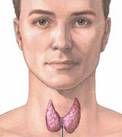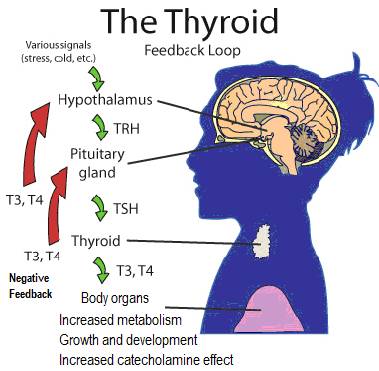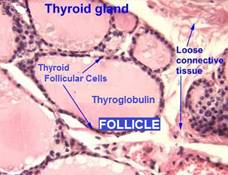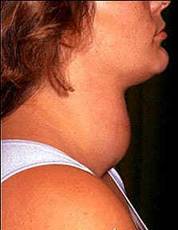What is hypothyroidism?

Underactivity of thyroid tissue → underproduction of thyroid hormones to maintain body’s normal metabolism
Present in Cretinism, Hashimoto’s thyroiditis;
Pituitary TSH levels rise. This is due to the negative feedback effect of low T3 and T4 thyroid hormones;
What causes hypothyroidism?
Hypothyroidism occurs as a consequence of several possibilities:
Insufficient iodine for thyroid hormone production. Most common worldwide cause;
Iodine deficiency is common – why is that?
- Severely stunted physical growth and mental retardation due to untreated thyroid hormone deficiency (congenital hypothyroidism) in babies or children born to women lacking iodine can cause cretinism.
- Sufficiency of maternal iodine prevents cretinism
- Babies with congenital hypothyroidism can be treated at birth with supplemental iodine.
Thyroiditis. Inflammation of thyroid cells resulting from a source of damage to thyroid tissue;
- Hashimoto’s thyroiditis. Most common problem causing hypothyroidism in N. America.
- Other forms of thyroiditis having hypothyroid phases: include Postpartum (second phase); Drug-induced; Silent; Sub-acute; Radiation-induced; Acute infectious.
- Inborn errors of thyroid hormone synthesis. Causes congenital hypothyroidism;
- Pituitary tumors (very rare). Cause low TSH levels and thereby reduce the production of T3 and T4. This is called secondary hypothyroidism.
Symptoms of Hypothyroidism | |
|---|---|
| Feeling constantly fatigued | Aching muscles / Vague aches and pains |
| Cold hands and feet | Weight gain without eating more |
| Coarse, dry, thinning hair | PMS /Heavy menstrual periods / menstrual cramps |
| Dry skin | Forgetfulness |
| Slow heartbeat | Loss of libido |
| Mental sluggishness/”Fuzzy headed” | Constipation |
| Depression | Pain in thyroid gland (at front of neck) |
| Low basal temperature | Infertility /anovulatory cycles / repeated miscarriage |
| Slowed knee-jerk reflexes | |
With hypothyroidism, the ability to convert tyrosine to DOPAMINE, NOREPINEPHRINE and EPINEPHRINE is impaired. This can cause a ripple effect of symptoms, including cognitive dysfunction.
Supposed hypothyroidism could actually be estrogen dominance
Estrogen dominance occurs when there is an imbalance of estrogen over PROGESTERONE in women (or TESTOSTERONE in men). Numerous, previously non-existent sources of estrogen in the Western world are now universally entering our bodies from our environment and diet. This estrogen overload is overwhelming the delicate balance with other hormones in the body, and Progesterone in particular. For information on this “epidemic” problem, see:
Thyroid hormone and estrogen have opposing actions
Thyroid Hormone causes fat calories to be turned into usable energy
Estrogen causes food calories to be stored as fat
- Estrogen dominance inhibits thyroid action and lowers the rate of metabolism of the Body
- Natural Progesterone inhibits estrogenic action
Estrogen dominance mimics hypothyroidism by interfering with thyroid hormones
The symptoms of hypothyroidism may occur because of estrogen dominance. Also, many other “presumed” thyroid dysfunctions (E.g. falling hair, water retention, loss of memory, dry skin) and autoimmune disorders are actually caused by estrogen dominance.
- Estrogen increases ▲ thyroid binding globulin (TBG) in blood hindering TH activity. Thyroid hormones are carried by TBG, a specific protein produced by the liver. An increased number of binding proteins hold onto more of the thyroid hormone. Since protein-bound (“tied-up”) hormones can’t bind to their receptor, this reduces the free thyroid hormones in the blood that will be available to cells for maintaining metabolism, even though blood TH levels may test normal or high. Circulating thyroid hormone is highly bound (>99%) to TBG.
- Estrogens will increase ▲ circulating levels of TBG, which decreases ▼ amount of free T4 available for cells to use, even though total T4 level increases. Drugs that can reduce free T4 include:
- Birth control pills
- Clofibrate
- Methadone
- Estrogens
- Androgens will decrease ▼ circulating levels of TBG, which increases ▲ free T4 and reduces total T4. Drugs that can increase free T4 include:
- Anabolic steroids
- Androgens
- Antithyroid drugs (E.g. propylthiouracil and methimazole)
- Interferon alpha
- Interleukin-2
- Lithium
- Phenytoin
- Propranolol
- Estrogens will increase ▲ circulating levels of TBG, which decreases ▼ amount of free T4 available for cells to use, even though total T4 level increases. Drugs that can reduce free T4 include:
- Menopause and perimenopause are transitional situations which require more than the usual amount of thyroid hormone. Due to higher estrogen compared to Progesterone levels.
- Estrogen inhibits thyroid secretion / Progesterone stimulates it. The body makes Progesterone from cholesterol if there is adequate thyroid hormone and other nutrients including vitamin A and certain enzymes.
- Estrogen dominance decreases sensitivity to thyroid hormone. A lab test will show thyroid hormone levels to be NORMAL or LOW NORMAL. It is the sensitivity to thyroid hormone that is decreased.
- High estrogen levels cause fat build up for a pregnancy. Estrogen does this by lowering your sensitivity to thyroid hormone.
Solution for clinical hypothyroid due to estrogen dominance
Deal with the estrogen dominance and after several months the thyroid function will return to normal. Thyroid supplements can be cut back, and eventually possibly discontinued.
The plan will include:
- Cutting down on estrogen intake
- Supplementing adequate levels of natural progesterone;
Estrogen Dominance / Solutions
Estrogen / Iodine / Cancer connection
Iodine metabolizes carcinogenic ESTRONE and estrogen metabolite16-α-hydroxyestroneto “anti-carcinogenic” ESTRIOL. Dr. Jonathan Wrights reports that iodine elevates the amount of anti-carcinogenic ESTRIOL produced and lowers the amount of ESTRONE and ESTRADIOL, so that the 3 forms of estrogen are more balanced in favor of cancer prevention. Wright J. One mineral can help a myriad of conditions from atherosclerosis to “COPD” to zits. [cited April 3, 2007]; Available from: http://www.tahoma-clinic.com/iodide.shtml
Iodine down-regulates estrogen receptors in breast cancer. Molecular work by Eskin’s group has shown that iodine down-regulates the estrogen receptors in breast cancer cells and changes the expression of genes involved in differentiation, cell cycle, hormone metabolism, and cancer growth. Stoddard FR, HShah K, Johannes G, Eskin BA, Brooks A. Iodine alters gene expression profile in the MCF-7 breast cancer cell line. Thyroid 2006;16(9):894






















